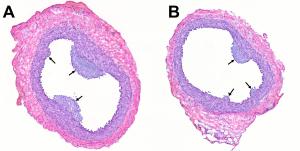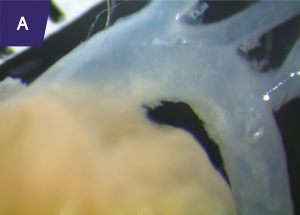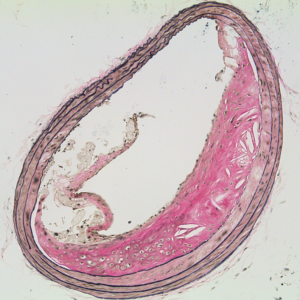Overview
All tissues and organs in the human body depend on blood vessels to deliver oxygen and nutrients and to remove cellular waste.
When blood vessels develop disease, they may become narrowed, reducing blood flow and threatening the survival of downstream organs such as the heart or the brain. Alternatively, blood vessels can become excessively stiff, resulting in high blood pressure, or they can become overly dilated and burst (a life-threatening condition, known as aneurysm rupture).
Vascular biology researchers in the Cardiology Division work in collaboration with other scientists and clinicians at the University of Washington to uncover the underlying causes of blood vessel diseases (including atherosclerosis, strokes, and aneurysms) and to develop novel treatments that prevent and reverse these diseases.
Current Projects
 Vascular gene therapy
Vascular gene therapy
Our work has clarified the promise and limitations of gene-transfer vectors to express therapeutic genes in the blood vessel wall.
Currently, we are testing gene therapies that prevent and reverse atherosclerosis, using a rabbit model of vein-graft atherosclerosis that was developed in our laboratory.
 Transforming growth factor- β (TGF-β) signaling in vascular disease and development
Transforming growth factor- β (TGF-β) signaling in vascular disease and development
We use mouse models to identify the pathways through which TGF-β signaling protects the aorta and through which loss of physiologic TGF-beta signaling causes aortic disease, including aneurysms.
 The urokinase (uPA)/plasminogen system and vascular disease
The urokinase (uPA)/plasminogen system and vascular disease
We recently discovered that ruptured atherosclerotic plaques in uPA-overexpressing mice resemble ruptured plaques removed from human carotid arteries, both morphologically and biochemically.
We are now defining the mechanisms through which stable atherosclerotic plaques rupture, causing heart attacks and strokes.



